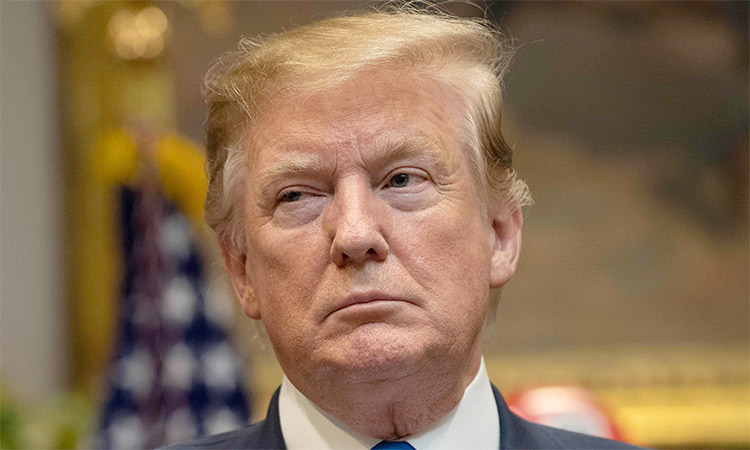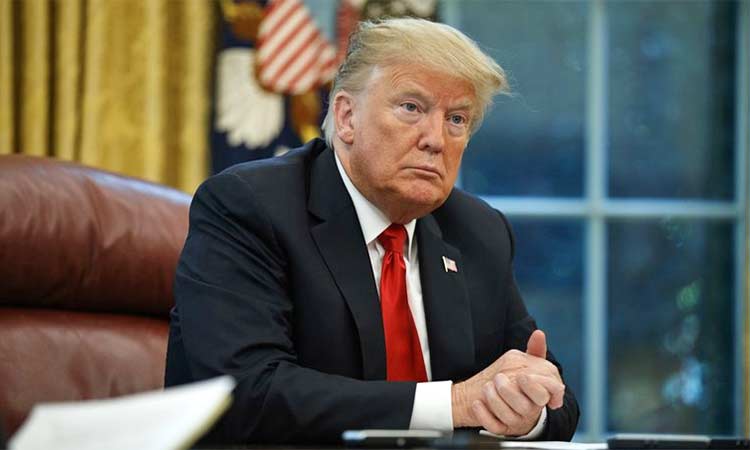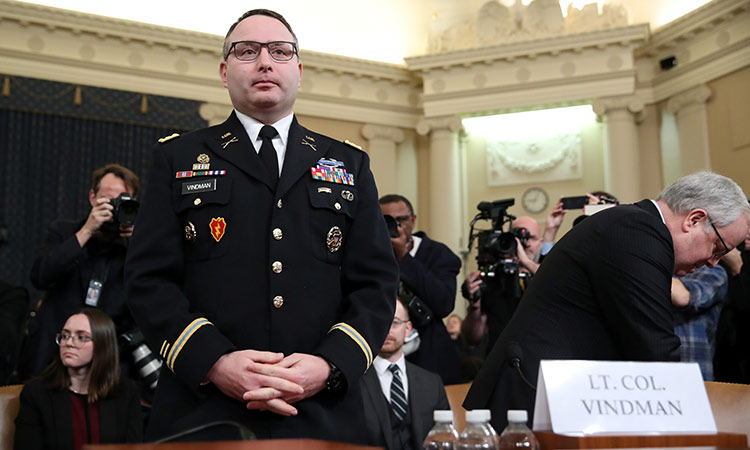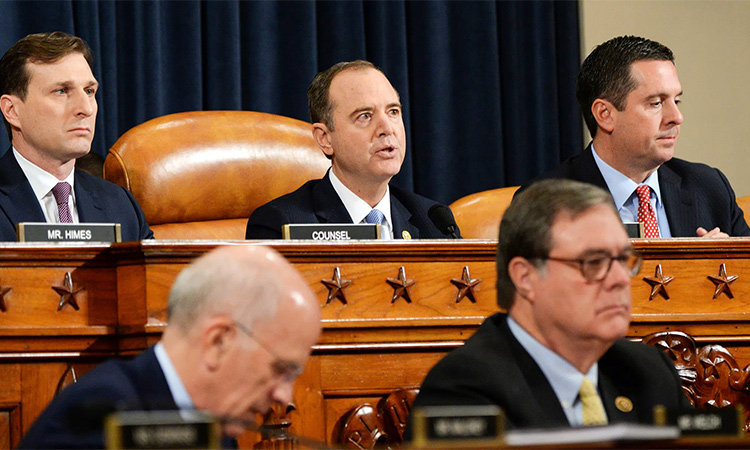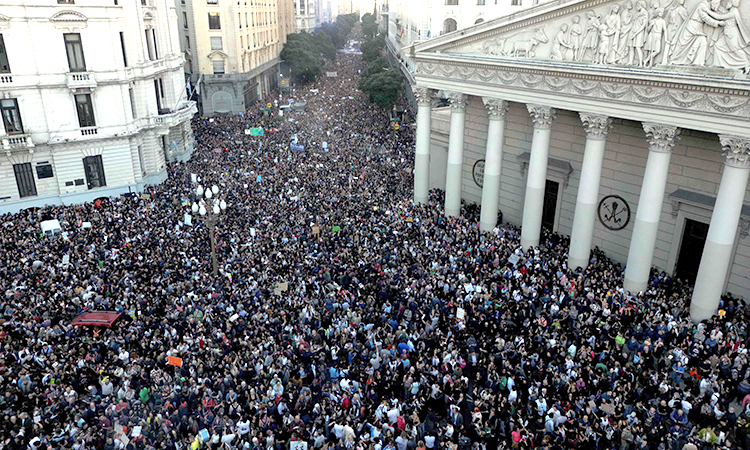Stone’s defence going against impeachment
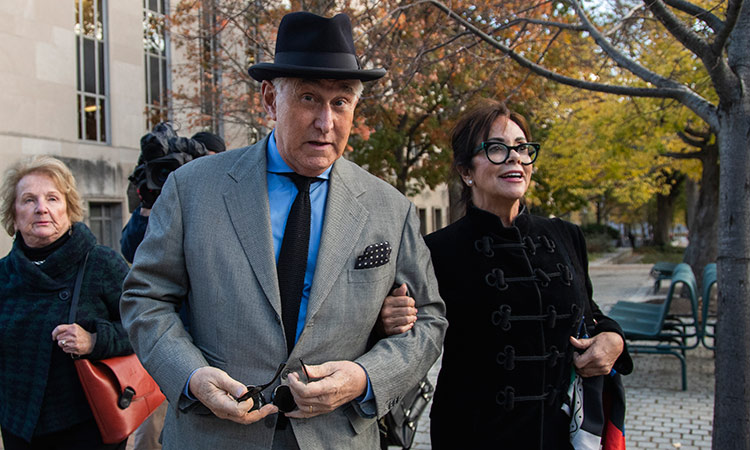
Roger Stone with his wife Nydia (right) leaves a federal court in Washington. Associated Press
Jon Healey, Tribune News Service
The House Intelligence Committee took a day off on Thursday from its televised hearings on impeachment, allowing intrigue-obsessed political junkies to turn their attention to the federal criminal trial in Washington, DC, of a longtime ally of President Trump, Roger Stone — who is accused of lying to the Intelligence Committee about his efforts to help Trump’s campaign.
And wouldn’t you know it? Stone’s defence has a lot in common with one of the Republican defences of Trump. As Stone’s lawyer Bruce Rogow said in his closing arguments on Wednesday, “So much of this case deals with the question that you need to ask ... ‘So what?’”
Jurors found Stone guilty on Friday on all seven charges he’d faced, so Trump’s supporters might need to find a better argument for the president’s actions on Ukraine.
Prosecutors contend that Stone concealed from the Intelligence Committee the extent of his contacts with the Trump campaign and his efforts to gain information from WikiLeaks about emails hacked from Democrats. They built their case on evidence from former Trump campaign officials and Stone’s own statements and phone and data records.
Rogow shrugged off the case as much ado about nothing. “So Stone didn’t tell the House committee about his efforts to get information from WikiLeaks — they never amounted to anything,” the Washington Post quoted Rogow saying. “So he didn’t tell them he talked to the Trump campaign about WikiLeaks — that’s not illegal.”
At Wednesday’s hearing in the Intelligence Committee, several Republicans advanced a similar line of reasoning with regard to Trump and Ukraine. They weren’t conceding that Trump did what the evidence suggests he did — that is, withhold vital aid and a promised White House meeting from new Ukrainian President Volodymyr Zelenskiy until Zelenskiy publicly committed to conducting two politically charged investigations that could help Trump’s reelection prospects. But regardless, they argued, whatever Trump may have done doesn’t matter. The president is entitled to set foreign policy, and at the end of the day Ukraine got the aid.
There’s at least two levels to this argument.
One is that Trump’s behaviour regarding Ukraine is merely a policy change Democrats don’t like, not an entry in the high crimes and misdemeanour checklist. As the president has said repeatedly, he sees nothing wrong in asking Zelenskiy for help on the two investigations in question, one of which targeted former Vice President Joe Biden, a possible Trump opponent in the 2020 election. And as acting White House Chief of Staff Mick Mulvaney memorably said at an Oct. 17 briefing: “Get over it. There’s going to be political influence in foreign policy.”
According to Mulvaney, presidents routinely hold up aid to countries until they take specific actions. “We do that all the time with foreign policy,” he said, citing the example of how Trump suspended aid to Central American countries “so that they would change their policies on immigration.” (Later that day Mulvaney retracted his admission about why Trump held up the aid to Ukraine, but he did not walk back his remarks about political considerations in foreign policy.)
But what Trump sought from the Central American countries isn’t at all like what he asked of Zelenskiy. The president can argue that his attempt to slow the flow of migrants from Central America across the southern US border serves the national interest more than his own interests, no matter how many Americans think the policy is wrongheaded and inhumane (or worse). It’s much, much harder to make the case that it’s in the national interest for Ukraine to assign its own investigators and prosecutors to cases designed to burnish Trump’s reelection chances.
Here’s where Trump’s defenders argue that we do have a national interest in determining whether Ukraine meddled in the 2016 election and whether Biden’s push to remove a top Ukrainian prosecutor in 2016 was motivated by a desire to prevent an investigation into the Ukrainian energy company his son worked for, Burisma.
But ask yourself, if Trump sees foreign election meddling as such a threat to Americans, why has he equivocated for years over the extensive and well-documented meddling by Russia? The obvious answer is that he has no abiding interest in the sanctity of US elections. Rather, he’s interested in undermining the broad consensus about Russia’s meddling on his behalf and pinning the finger instead on Ukraine. Similarly, if the US official who spearheaded efforts to remove a Ukrainian prosecutor who was dragging his feet on anticorruption investigations had been named Cheney, would Trump be calling for an investigation? (Hint: No.)
We know what motivates this president.
But there’s a second level to the “So what?” argument: that what Trump did doesn’t rise to the level of an impeachable offence (or to the level of removing him from office, if the House votes to impeach). The more evidence that the House amasses that Trump and his proxies did, in fact, pressure Ukraine to conduct the two politically motivated investigations, the more relevant this argument becomes.
One of the main planks in this defence is Trump’s support for sending weapons to Ukraine (“lethal” aid), which President Obama wouldn’t do during his tenure for fear of provoking Russia to be even more aggressive in taking Ukrainian territory. Granted, the aid to Ukraine may have been delayed a few months, and sure, the delay may have contributed to the deaths of some Ukrainians who are trying to hold off Russian-backed rebels. But Ukraine is still better off with Trump as president, Republicans argue, than when they were receiving nonlethal security assistance from Obama (which the GOP refers to as “blankets and meals,” or the equivalent).
This is a variation of the “no harm, no foul” defence (or, as former “Simpsons” executive Bill Oakley called it in the Washington Post on Thursday, the “Sideshow Bob” defence). And it seems absurd to argue that there should be no punishment for doing something improper just for a limited time.
Yet once the facts in the case are established, the debate inevitably turns to the significance of the actions in question. House members have to decide not just whether Trump did what he’s accused of doing, but also whether it’s worth impeaching him for it. (And senators, if it gets that far, have to decide whether he should be expelled from the White House and barred from running for office ever again.)
“So what?” may not be the right question to ask the jury considering the comparatively straightforward question of whether Roger Stone violated federal law. But it’s an unavoidable question to ask lawmakers considering whether Trump’s actions merit impeachment.
